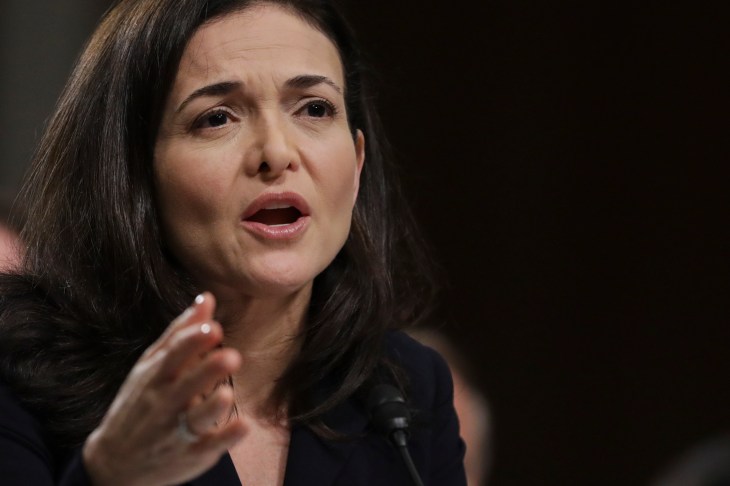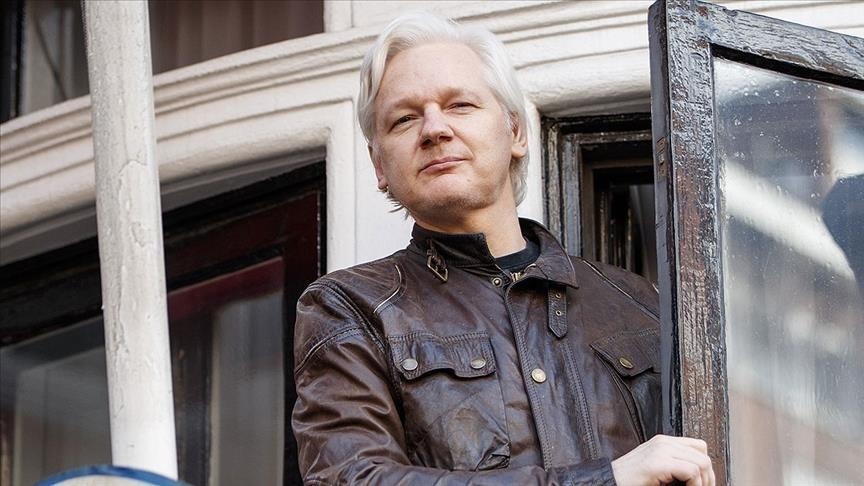Interview with Silvia Federici
Catrin Ashton
Silvia Federici
31 January 2022
Unpaid housework – forgotten by Marx, championed by the 1970s feminist Wages for Housework Campaign – has become a point of pandemic contention for working mothers. And care workers, mostly underpaid women with families, are facing the worst. Could vaccine mandates that sidestep the autonomy of workers’ bodies therefore be a stage too far?
Catrin Ashton: I first came across your work at a personally ideal moment: I had been at home for a few months with a newborn when I read Maria Rosa Dalla Costa and Selma James’s 1974 essay ‘The Power of Women and the Subversion of the Community’. What struck me was how little had changed in 40 years. I had grown up with a concept of feminism which no longer seemed to apply with a baby. My job had involved travelling. I gave that up and was suddenly at home with no transport, no money of my own.
It was a very strange situation to be in, quite suddenly. Then we started a campaign in Wales inspired by Wages for Housework. Could you give an overview of the campaign’s beginnings and explain the inspiration behind your involvement?
Silvia Federici: Our campaign began in the early 1970s with women from different countries, mostly from Italy and some from England. I was in the US at the time but from Italy. The Wages for Housework Campaign was an alternative to the strategies that many feminists were organizing as a path to women’s liberation. The dominant trend within the feminist movement back then mostly came from a leftist tradition.
Actually, you had two trends: one from radical feminists, who identified patriarchy behind the system of women’s oppression but never clearly defined how male dominance had evolved historically (the strategy of radical feminists was usually to create cultural spaces that would mostly be women’s spaces); then you had the socialist feminists / Marxist feminists who told us that the way to liberation was to take waged jobs and join the working class, that the problem with women – discriminated on the basis of gender – originated from women’s confinement to domestic work.
It was argued that domestic work doesn’t produce any social wealth, that domestic work is a backward activity, that it isn’t really part of the capitalist organization of work and, therefore, women who are mostly involved with this kind of work do not have power to change society.
Men, for instance, can withdraw their labour. They can go on strike because they are producing capital, and so they can stop the flow of capital. Therefore, the argument, which you find in Marx and Engels and the whole Marxist communist tradition, was that women’s liberation means going out, joining the union, etc. But I came from a whole set of feminists who began analysing the condition of women’s work, of domestic work, and we came to a very different conclusion.
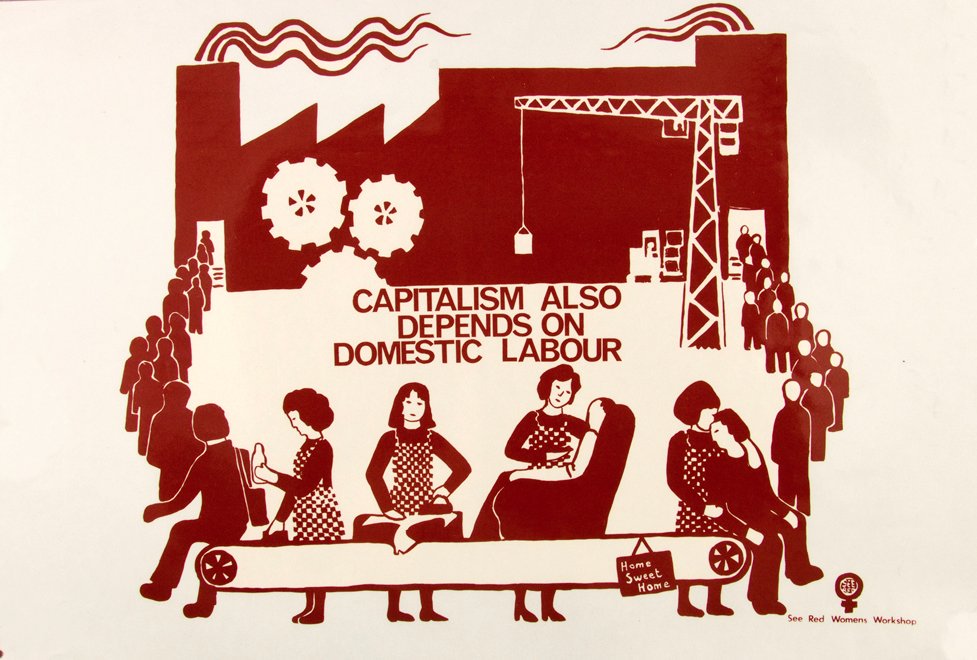
‘Capitalism also depends on domestic labour” (1970s-80s) poster by See Red Feminist silk-screen collective Photo via womensart1 from Twitter.
We concluded that domestic work – housework – is an extremely important part of the capitalist organization of work. What is being ‘produced’ through housework is the workers themselves.
In other words, the capitalist organization of work, as described by the left tradition, was a very partial one, because it only recognized production and wage labour production, industrial production, office work. It only recognized wage labour and the production of goods. It never saw the whole organization behind the production of the worker, the production of the capacity to work. So, for us, the Wages for Housework Campaign had many meanings.
First of all it made visible that this work is not just a natural activity, something women do because they are women. It is not the leftover of a pre-capitalist society but work that is central to every activity, to every economic activity.
Although not the only goal of the campaign, saying we wanted a wage for housework – the support system, the pillar of every economic activity – because we are working for the same employers that wage workers are working for, was very central. It was an epistemic strategy to make visible what until then had remained invisible.
Catrin Ashton: It was this aspect of the campaign that I found so exciting. It radicalized being a mother or being at home. You gave some power to that position, making it possible to talk about changing society from there rather than having to leave the home.
Silvia Federici: Yes, because in the left tradition, in the Communist Party and in the organization of women on the left, they became workers only when they went to the factory or when they went to work outside the home. Otherwise, they were not considered workers, and this is something very important, because it meant that this organization never recognized not only the work that women do but also the function of housework in the production of the workforce.
They never looked on the home as a place of struggle. The place of struggle was wage labour only, in line with Marx.
And they didn’t understand something profound about the capitalist organization of work, about capitalist accumulation as a whole: by not seeing the unpaid labour that women do, not acknowledging that whole capitalist class, every employer has exploited that labour, has benefited by naturalizing it, by making it appear as a ‘labour of love’, by not recognizing it as work.
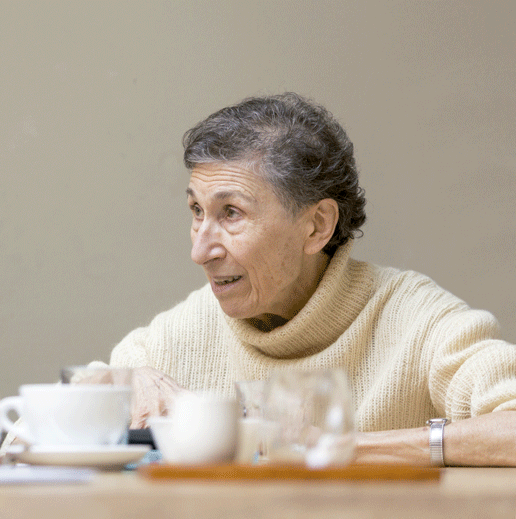
Silvia Federici, photographed by Dani Blanco, CC BY-SA 3.0, via Wikimedia Commons
By ignoring all of this, not only did they embrace – legitimize and embrace – the capitalist viewpoint, but they also presented a very distorted image of capitalist accumulation. Capitalist accumulation, in their view, takes place in the factory, in the office, takes place through wage labour.
They didn’t see that the wage organizes the work of the community, organizes the work that takes place in the home, that with these wages, employers employ not only one worker but more than one worker: they also employ the people who are reproducing them, who are reproducing their capacity to work.
We realized that capitalist accumulation depends on the huge amount of unpaid labour, which is much wider than the Marxist socialist tradition ever acknowledged.
And we also recognized the connection between sexism and racism. Wage capitalism has created a labour hierarchy with paid workers on top: mostly white, mostly male. Unpaid workers – women, houseworkers, colonial subjects – are, of course, at the bottom. Slaves and slavery have been hugely significant for the accumulation of capital.
Looking at the discrimination of women from the point of view of reproduction has given us a different perspective on capitalism as a whole.
Catrin Ashton: The connection you make between the work that a woman does privately in her own home and all unpaid work done everywhere, globally and historically, which you describe as central to capitalism, is particularly inspiring.
Silvia Federici: Once we understood the significance of what reproductive work, what housework represents in the organization of work, in the process of accumulation, then we also began to understand the role of the wage. We saw that the wage is not compensation for work done or even a way of extracting some unpaid labour from the working day of the waged worker. Rather the wage is a whole way of organizing society. It’s also a way of concealing entire fields of exploitation by describing only certain workers, only waged workers, as workers.
It naturalizes and conceals entire fields of exploitation. We know, for instance, that Marx, as an abolitionist, wrote to Lincoln during the US civil war about the first international campaign to boycott the cotton trade for its use of slave labour, both congratulating him on the emancipation declaration and criticizing him for not really analysing slave work as a producer of capitalist accumulation in an entire three volumes.
There are passages here and there, but, for Marx, the fundamental terrain of struggle – industrial work – was underrepresented. Marx saw slavery in the same way he saw domestic work, as a kind of activity that would be left behind, that is historically backward, to be transcended by a future of capitalist development.
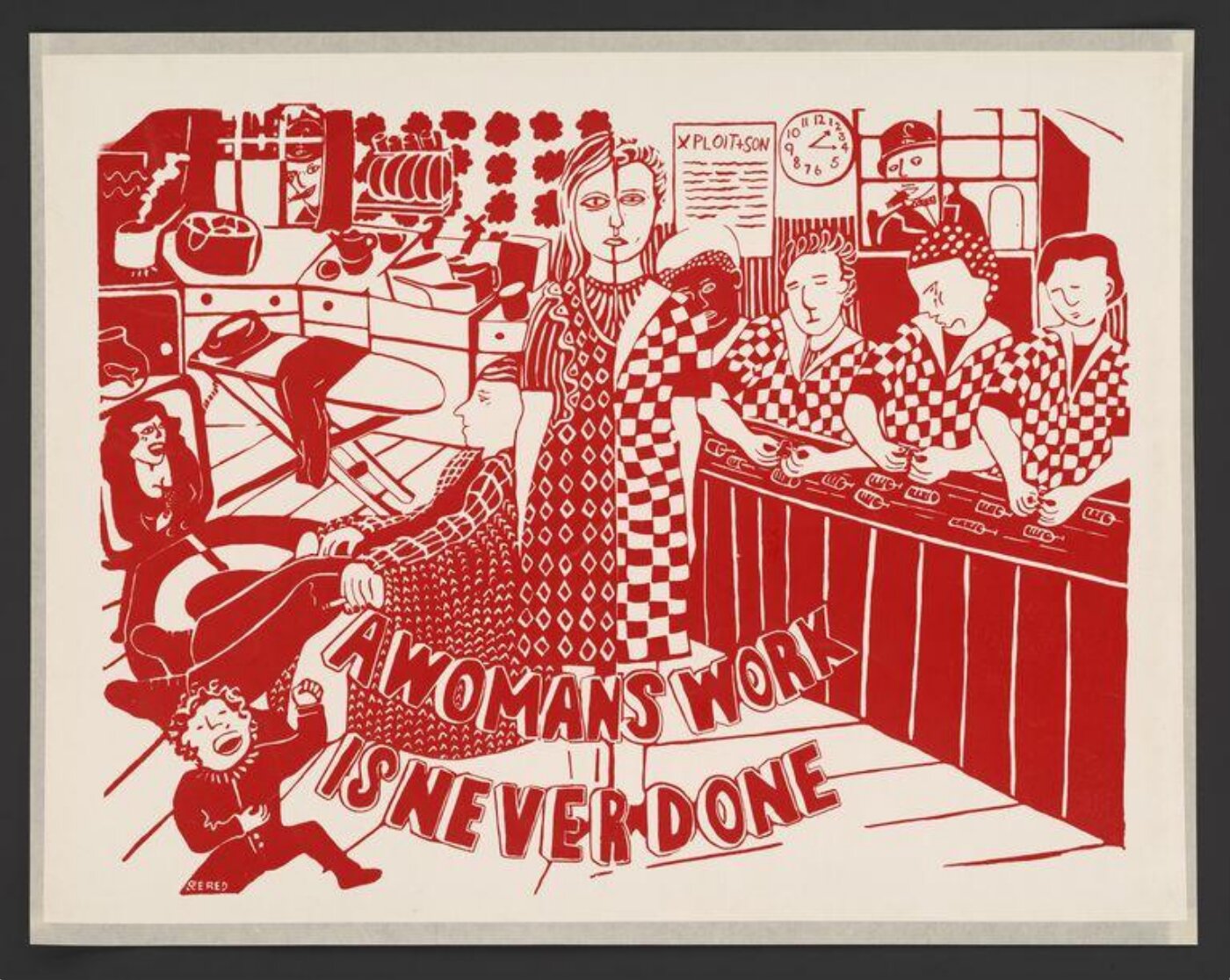
See Red Women, A Woman’s Work Is Never Done,
(screenprint in red ink, 1976). Gift of the American Friends of the V&A;
Gift to the American Friends by Leslie, Judith and Gabri Schreyer and Alice Schreyer Batko.
But we have seen that this hasn’t really been the case. The abolition of slavery has been more formal than real. We have seen, for instance, that with the process of globalization, the world expansion of capitalization since at least the late 1970s, has led to an expansion of informal labour. This has led to the expansion of all kinds of unpaid activities, of informal activities that are outside the wage relation. So, when we spoke of housework, we interpreted it as a prism, as a window to look at the capitalist system, which was really important for me.
I think that the work we did in the 1970s – analysing housework, analysing wages – was fundamental to decipher, interpret and analyse the whole process of recolonization that happened in the 1980s and 1990s and still continues throughout Latin America, Africa, influenced by the work of the IMF, structural adjustment, privatization, etc. It helped me tremendously with the work we had done because we understood capitalism’s relevance in relation to unpaid labour and hierarchy.
Capitalism is a producer of differences. Capitalist development has to continually develop new hierarchies, new divisions. It always responds to its crises through a massive process of expropriation, a massive process of expulsion from any means of reproduction.
When Maria Rosa Dalla Costa says that the housewife is iconic – which, of course, is a statement that has to be qualified – there’s something very profound there. She is iconic as a figure that embodies the unpaid worker. She is both the ‘unpaid worker’ and the ‘worker’, who is not recognized as such. She is a marginal figure or one destined to be surpassed by capitalist development.
Capitalism’s expansion has augmented unpaid labour. Students in the US and Europe, for example, are asked to do an enormous amount of unpaid work under the pretence of gaining skills, experience. We know of companies who are laying off workers because universities are sending them unpaid interns.
Catrin Ashton: And, despite the idea that women are somehow emancipated from housework, because we could go out to work if we wanted to and even earn high wages in some cases, the pandemic has shown that women still do most of the housework.
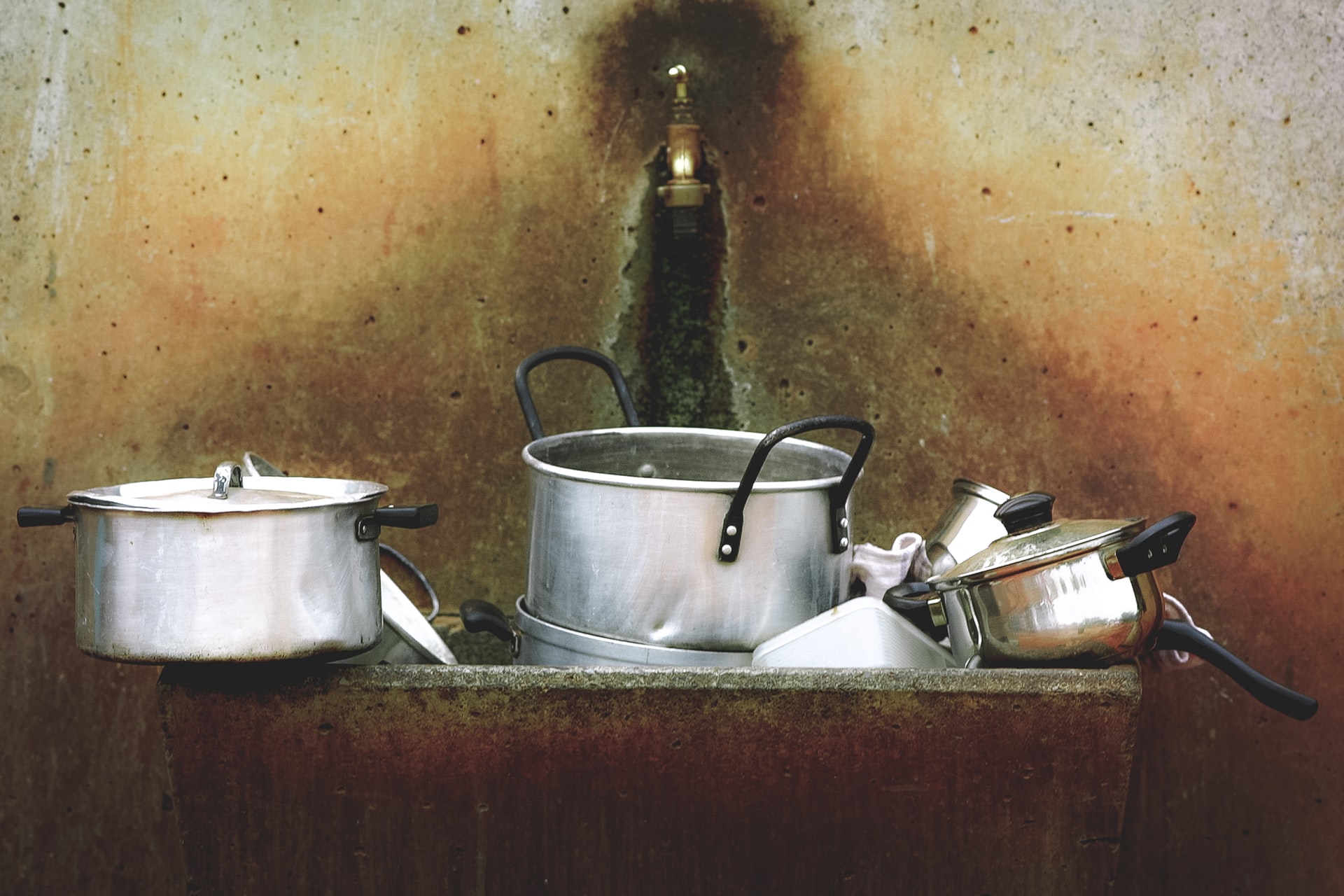
So after capitalism, who will do the dishes? Photo by Scott Umstattd on Unsplash.
Wages for Housework was a campaign for much more than just a wage. Amongst other things it called for women’s autonomy over their own bodies. There was a pro-abortion campaign, anti-sterilization campaigns and campaigns against the medicalization of women’s bodies. The call was for women to be able to understand their own bodies. There was also a call for the state to stop controlling women’s bodies, in order, for example, to control birth rates.
In the UK, a large proportion of care home staff comes from the Global South or Eastern Europe. They tend to be a demographic that’s wary of COVID vaccinations, and yet, here they are, mostly women, greatly underpaid and being told to do something to their bodies that they are reluctant to do, for the good of the people. You’ve written about how capitalism has transformed the body into a work machine, and here’s an example of the work machine being adapted so that it can work ‘better’ in pandemic conditions.
Other than questioning the timing of decisions – whether reactions were too quick or too slow – I don’t think we, on the left, have adequately critiqued the UK government’s response to the pandemic. Do you think that this is fair, due to the nature of this crisis, or do you think that, as Marxists, as feminists, as activists on the left, we need to be asking more questions?
And, going back to care workers, how does the current issue fit into the wider historical context of state control over working-class women’s bodies? Is there a question over the negative responses they receive if they don’t comply?
Silvia Federici: Yes, there are many questions. But let me quickly give some context first.
The Wages For Housework Campaign also dealt with abortion. We were critical, as many black women’s organizations were too, of the exclusive position that the feminist movement held on abortion. Abortion meant the right to choose and, we said, in order to choose, in order to control our reproductive capacity, we must also fight for the right to have children.
In the US, black women have always been denied maternity rights. This has been the case from the time of slavery to the present day. Control over our bodies has two aspects: we want to be free to decide not to have children, but we also want the right to have children. In order to have children, there’s a struggle for the necessary resources so that we don’t have to be dependent on a man.
Also – and this is important – we have seen over the years that women who have gone on to take a job outside the home, with some exceptions, take precarious, underpaid jobs without autonomy. In the US, working class women have huge amounts of debt, because the wage is never enough: it is a big struggle to earn 15 US dollars an hour; most people make 7 dollars an hour; and millions are making only 15,000 dollars a year, including migrants who also need to send some money home. Clearly, these are not liveable wages, so people have recourse to loans. It’s the only way to survive.
During the pandemic 5 million women have lost paid employment. And 2.5 million have spontaneously left their jobs because they had children at home when schools were closed. The situation is desperate.
Domestic workers are in a terrible situation. First, in both Europe and the US, they are largely migrant women from Africa, the Caribbean, the Philippines who have left impoverished countries, either destroyed by wars, by the politics of the IMF, international capital, the European Union, the US government and so forth. Then, when the COVID-19 epidemic began, many were left with nothing from the families they worked for.
Not only have they suffered personally but also their entire families, whom they support, have suffered. I feel it’s unjust to force them to be vaccinated against their will.
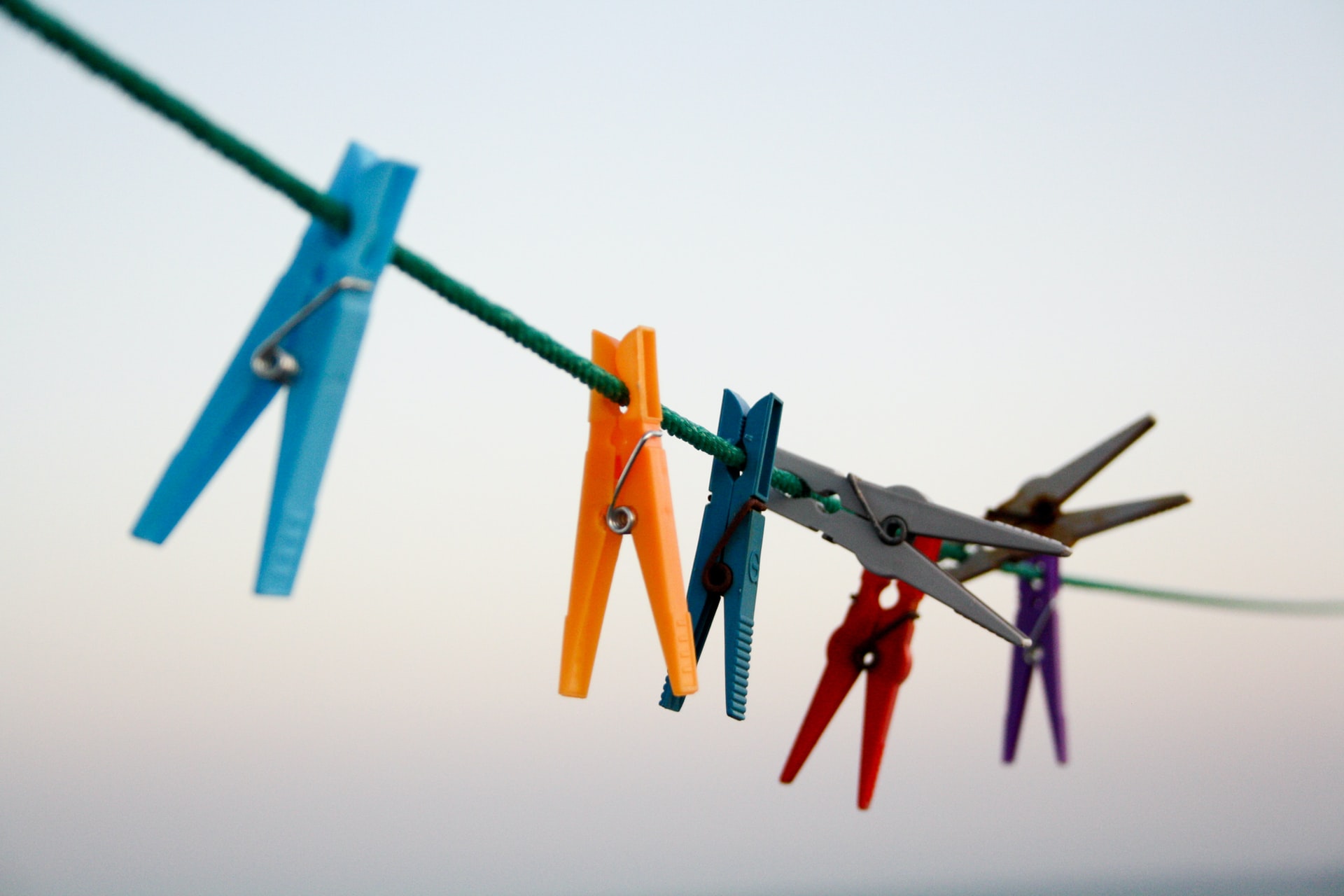
Tolls of a trade? Photo by Félix Prado on Unsplash.
It’s very difficult for people such as myself to take a proper position on vaccination because we don’t know all the details. I’m not a doctor. I don’t have the qualifications to understand all aspects of these new vaccines. But there are certain questions that stand out, such as why is it that we never hear of therapy, or other means that can also help.
We aren’t aware of how many people are equally dying of cancer compared with COVID-19. Yet cancer raises questions about wider issues of pesticide use, water and air contamination, an environment that is more and more destructive to our bodies, especially in underprivileged parts of the world. This is not being talked about which makes me extremely suspicious that what is at stake is not really concern for our health but concern for the profit of big corporations.
COVID-19 vaccines are sold as a universal solution, the miracle. We are told not to worry about the long-term consequences. But we don’t know what they are yet. Of course, this doesn’t mean that COVID vaccines aren’t providing protection. But we are told anything is better than death, so we embrace the philosophy. I think there are many remaining questions centred on healthcare systems that have been destroyed over the years.

The great mortality COVID-19 has engendered is a political disaster. Such mortality could have been avoided if our healthcare systems, our nutritional care, had not been continually undermined. But raising a doubt about vaccines makes you a Trump supporter and a fascist. I really resent that now when we go out, the first thing anybody asks each other is, ‘are you vaccinated?’ I think that the discussion is more complex.
The pandemic provides a moment of truth. The system we follow is destructive. It puts us all in danger but some more than others: black communities, the elderly, people of the former colonial world. And we have also seen the incredible mercenary character of many pharmaceutical companies. They have used public money for their research and are now making everyone pay and often limiting the right to patents.
It’s clear that the capitalist class is going to use COVID-19 internationally for a major restructuring of capitalist development. The World Economic Forum is talking about a capitalist reset: a new form of capitalist development, the reorganization of work, a redistribution of wealth. I want to know if the people who are interested in a different kind of society are also those who are going to organize a reset. For me, the question is who exactly is going to set the stage for what is going to come next.
An edited Welsh version of this interview was published in O’r Pedwar Gwynt, summer 2021. Based on an interview held by Undod and the Communist Party in Wales in December 2020.
Published 31 January 2022
Original in English
First published by O’r Pedwar Gwynt
Contributed by O’r Pedwar Gwynt, summer 2021
